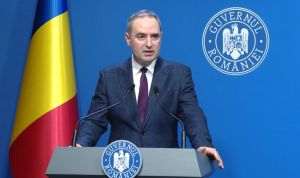Romania's joining of the fiscal pact, concluded by the European leaders at the summit which was held in Brussels at the end of last week, will have a favorable effect on the economy, and will result in more disciplined macroeconomic policies, Valentin Lazea, chief-economist at the Romanian National Bank (NBR) said on Friday, at the EU-COFILE seminar, hosted in Sinaia by the NBR, the Romanian Banking Association and Alpha Bank.
"One of the decisions which were made yesterday (ed. note: Thursday) concerned the strengthening of fiscal rules, in the sense of drawing the attention of European leaders to the budgets and penalties for countries which exceed the budget deficit and public debt targets. 17 countries and 6 more joined this pact, including Romania, which I think has a favorable effect because it will bring discipline to the macroeconomic policies".
Discussing the second decision made by the European leaders, to have the European Financial Stability Fund (EFSF) be managed jointly with the European Central Bank (ECB), Valentin Lazea said that this means the ECB can focus more on saving commercial banks and less on saving governments.
"The Fund will be managed by the ECB, but it will be the one to save the countries through bonds purchases", according to him.
Valentin Lazea also said that Romania needs to hope that there will be a "favorable solution" to the problems in the Eurozone, because it is "organically" tied to it from an economic point of view. He hopes there will be more answers provided to the other questions that the financial markets are asking, and Western European politicians will get ahead of the events rather than belatedly react to them like they used to do until now".
As to what concerns the fact that the countries outside the Eurozone, including Romania would have to contribute, through their central banks, 50 billion Euros to the loans worth 200 billion Euros which the European Union wants to grant to the International Monetary Fund (IMF) in order to fight the crisis, Valentin Lazea said that the goal behind this approach was to increase the lending ability of the fund.
He said: "I think the basic idea is to increase the lending ability of the fund. Yesterday, before this decision was made, the fund had about 285 billion Euros available for lending. I think that, through this decision, has boosted the lending capacity of the fund, which also has a higher multiplier ability, meaning it can attract funds from third party governments and lend them to the governments that need them. The fact that Romania will contribute as well (...) is a price which needs to be paid, because from now on we have to get used to the idea that the benefits come included with the cost. You can't score a free meal".
As for Romania's objective to join the Euro, Valentin Lazea said that it represents a political decision. The accession is hard from a technical point of view, but the road to the Euro is at least as important as getting into the Eurozone or living within it, as revealed at the end of last week, he said.
At the end of last week, European leaders agreed to sign an intergovernmental agreement which requires EU member states to apply a stricter fiscal and financial discipline in their future budgets. The efforts to achieve the unanimity among the 27 members of the European Union failed, because Great Britain and Hungary have refused to join the plan. Still, the 17 members of the EU agreed to the new treaty, together with six other states that want to adopt the Euro in the future.
• Boc: Romania will not contribute to the capitalization of the IMF
Romania will not be required to contribute to the capitalization of the IMF, because it is one of the countries which have concluded an agreement with it, PM Emil Boc said on Friday, and said he is basing his statement on the current data, but that the conclusion of the EU leaders needs to be awaited.
"Based on the data that I currently have, the conclusion is that the countries which are part of an agreement with the IMF aren't going to contribute to this supplemental fund, but we will await the conclusions of the EU to see whether that opinion still stands", Boc said on the public radio.
The measures agreed on Thursday night, at the EU summit in Brussels, include the supplementation of the financial resources of the IMF by 200 billion Euros by the EU states, through bilateral borrowing.
According to the press release issued at the end of Thursday's talks, the member states need 10 days to confirm the participation in this effort.
Thus, the countries in the Eurozone would contribute 150 billion Euros, and the central banks of the countries outside the Eurozone would have to contribute 50 more billion Euros.
The Council of the EU has also invited "the international community" to bring similar contributions to the resources of the IMF.


























































